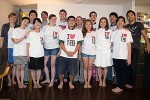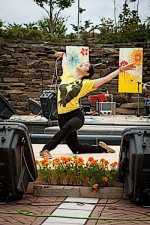Title
More than two years after the earthquake, tsunami, and nuclear disaster devastated the Tohoku region of Japan, I was part of a group of nearly a dozen Juilliard students and friends who returned to the region this summer to help. After one concert we gave in a temporary housing complex, an 80-year-old woman told us that music was continuing to heal her heart. Other people said they were delighted because they had never before had the opportunity to hear a live cello performance or see instruments so close-up, and another woman was moved to tears for the first time since the shock of the tsunami. As artists who work and dream of having a chance to perform in multimillion-dollar concert halls with perfect acoustics, it was performing in the makeshift homes of tsunami survivors who had lost everything that gave us a renewed joy and reminded us once again that our gifts and talents can serve and meet the needs of the world, and bring hope to the hopeless.
From left: Abi Lowther, Grace Song, Sean Kennard, Lisa Iwaki, Roger Lowther, Kristen Holritz, Josh Holritz, Doori Na, a member of the Community Arts Tokyo staff, Lee Jeon, a volunteer, Luka Oida, Joseph Lee, Stephanie Wu, and another volunteer.
(Photo by Tricia Schoon)Body
The 2011 disaster had damaged more than 1.2 million buildings and left around 19,100 dead or missing and 400,000 homeless, and much still needs to be done in the area. This was the third summer that our group, all members or friends of the Juilliard Christian Fellowship, took advantage of this unique opportunity to bring music and dance to the Tohoku region. Through funding from Juilliard’s Summer Grants Program and the generous support of numerous individuals, our group was able to return and continue working with many of the organizations that have emerged as a result of the disaster. Among them are Brave Action, which helps Tohoku fishermen get back on their feet; Nozomi Project, a social enterprise that creates jewelry out of broken pieces of pottery left in the wake of the tsunami and in turn brings sustainable income, community, and hope to women who lost their livelihood; and Grace Mission Tohoku, which hosts volunteers from all over the world—including ours—and helps with ongoing projects in the area such as residential mud-outs and construction. It also provides English classes and arranges visits to the temporary housing complexes set up in the wake of the tsunami.
Our team included current students Lee Jeon (violin), Doori Na (violin), and me; alumni Sean Kennard (M.M. ’12, piano), Grace Song (B.M. ’11, dance), Joseph Lee (B.M. ’06, M.M. ’08, cello), and Kristen Vanderschaaf Holritz (M.M. ’11, flute); and Kristen’s husband, Josh Holritz. We were also joined by Manhattan School of Music piano graduates Luka Oida and Lisa Iwaki. Though our stay in Japan was relatively brief (only 11 days), the fact that it was our third year had earned us the trust of many of the year-round relief workers and groups, which meant that we could easily partner with many of them on our activities, concerts, and lessons.
Our work reminded us that our gifts and talents can bring hope to the hopeless.
We were also able to spend time in Tokyo and work with Community Arts Tokyo, which was started by Roger Lowther (M.M. ’98, organ), our main contact in Japan. Through this group, we had the opportunity to introduce young children to classical music at a family-friendly coffee house concert, give private lessons to young musicians, and meet local professional and student musicians, visual artists, and filmmakers, many of whom have used their own art to help disaster relief.
Lowther also initiated the Liberty Music Program earlier this year. He created it after a woman from the tsunami-wrecked area said, during Juilliard’s trip last summer, that their town had also had a talented young musician who studied at a conservatory, but that regretfully would probably never happen again since the tsunami wiped out countless instruments and that schools have suspended musical instruction. Hearing this, and also that families no longer have the luxury of providing music lessons for their children as all their efforts are aimed toward rebuilding, Lowther was inspired to found the program, which provides children in the disaster area with classical, gospel, and folk music lessons in their schools in the hope that they will begin dreaming for a brighter future and not live in fear of losing everything again. The program’s slogan is “To Dream Again.”
Two years after the tsunami, the arts continue to play an important role in Japan’s recovery. They bring community, joy, and openness of expression. Thanks to Juilliard’s Summer Grant Program and our generous supporters, we gladly see, year after year, new life and new beginnings come out of this great tragedy, and our aim is to continue sharing our music, dance, and the beauty that sustains us.






